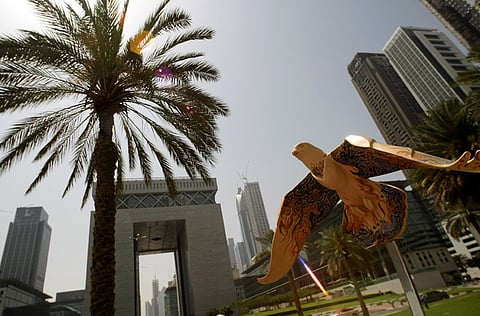UAE corporate profits set to rise
Banks expected to boost performance as non-performing loans decline

Dubai: The financial performance of UAE corporate entities will strengthen this year as the economy emerges from the downturn and profitability, which eluded key sectors last year, returns on the back of gross domestic product (GDP) growth.
According to Minister of Economy Sultan Bin Saeed Al Mansouri, economic growth will more than double this year to 3.2 per cent as oil prices strengthen and business activity increases. The government is taking steps to ensure growth, including an update of the companies law to allow non-locals to hold a higher stake in their businesses and a draft law to protect the interests of foreign investors.
UAE banks will improve their performance this year after a 21 per cent drop in aggregate profits last year as the incidence of non-performing loans eases, analysts said.
The other sector that was negatively affected in 2009, real estate and construction, is expected to begin the process of normalisation, but will likely take longer to return to profitability, they said. Net earnings at real estate companies in the UAE saw an aggregate erosion of almost 75 per cent last year, according to data collated by Kuwait-based Global Investment House.
Gainers
Four of the six UAE industry segments tracked by Global reported declines in 2009 with the consumer sector being the top gainer, up 52.10 per cent with aggregate profits coming to Dh910.52 million. On the flip side, the real estate sector reported the biggest decline of 74.41 per cent, with total year-end profits standing at Dh2.22 billion, compared to Dh8.69 billion recorded in fiscal 2008.
The banking sector contributed the most to the overall earnings with 43.92 per cent of total market profits. The sector's aggregate profits stood at Dh13.82 billion in Fiscal 2009 compared with Dh17.64 billion in Fiscal 2008.
Despite the economic slump, 10 UAE banks posted an increase in profits in 2009. Nine of these are listed on the Abu Dhabi Securities Exchange, or ADX, and one on the Dubai Financial Market, or DFM.
"The big questions for banking sector earnings in 2010 are: where will provisioning be and will non-performing loans, or NPLs, peak," independent financial analyst Raj Madha told Gulf News. "The evidence is still that provisioning will be significantly elevated but I would expect to see the peak of NPLs sometime this year. So that's a positive for the sector."
UAE national banks' mediocre performance in 2009 can be attributed to bad debts triggered by the global financial crisis and regional problems that resulted in heavy provisions, which in turn had a negative effect on earnings. Banks had to make record provisions against NPLs in 2009. Central Bank figures showed the collective NPLs by the UAE's national banks totalled about Dh12.90 billion last year, more than double the provisions of Dh4.50 billion allocated in Fiscal 2008.
"While provisioning will certainly not be as high as last year, volume growth in loans will still remain weak," Deepak Tolani, Vice-President at Al Mal Capital, told Gulf News. "Margins will remain stressed for two reasons: one is the higher cost of funding for UAE banks and the other is the inability to pass on the higher costs to the consumer."
Nevertheless, earnings are likely to rebound by 5 to 10 per cent this year, Tolani said.
Real estate has been one of the hardest hit sectors in the UAE, witnessing a decline in rental and sale prices. Data from Global reveals this sector reported the biggest drop in profits among all sectors for 2009, down 74.41 per cent with aggregate profits standing at Dh2.22 billion compared with Dh8.69 billion in 2008.
All but two companies saw their annual profits decline, with blue-chip companies posting the biggest drop. Emaar Properties posted a profit of Dh165.59 million in 2009 compared with Dh327.12 million in the previous year. In Abu Dhabi, all three real estate companies declined last year with Sorouh Real Estate posting the biggest drop of 74.02 per cent to Dh482.79 million.
"I believe we will see the fallout in the construction sector stabilise this year. However, the oversupply of property will take more time to work through the system, with projects continuing to be delivered," Madha said. "The UAE needs sustained immigration and business expansion to fill all the property that has been created."
He added: "The overall picture is likely to be an underlying stabilisation for the banks, but with a continued fruition of problems accumulated over past years."
Among the better performers, the consumer sector posted a 55.74 per cent increase with aggregate profits standing at Dh885.23 million in 2009, according to Global data. The telecommunications sector witnessed a 6.87 per cent increase in aggregate profits for 2009 to Dh9.10 billion. Emirates Telecommunications Corporation, or etisalat, reported a net profit of Dh8.84 billion, an increase of 3.82 per cent over 2008. The services sector posted a 18.65 per cent drop in profits to Dh4.41 billion.



